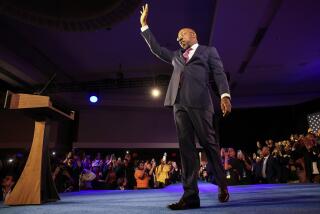Bush Is the Prime Beneficiary of Republican Gains
- Share via
WASHINGTON — His name wasn’t on the ballot, but perhaps the biggest winner in Tuesday’s election was George W. Bush.
In the weeks leading up to the vote, the president put diplomacy and war planning on the back burner and plunged into politics, putting his popularity and prestige behind the Republican push to regain control of Congress.
Bush’s gamble paid off: . The GOP retained control of the House and regained the Senate.
With those new GOP victories, Bush now will have more clout to pursue a political agenda that stalled last year when Republicans lost control of the Senate.
White House officials crowed that for the first time since 1934, the president’s party gained seats in both the House and Senate during a first midterm election.
“No matter how it ends up tonight, history was made,” said White House Press Secretary Ari Fleischer.
The GOP performance suggested that Bush’s popularity has translated into real gains for his party. In the hard-fought House, Senate and gubernatorial districts where the president campaigned, at least three out of four of the GOP candidates appeared victorious.
The sweetest victories for Bush may have been in Texas, the president’s home state, where the Republicans held on to a crucial Senate seat and retained the governor’s office, and in Florida, where his brother was reelected governor by an unexpectedly large margin.
“It’s looking like a Republican night,” said GOP strategist Scott Reed, who managed Bob Dole’s 1996 presidential campaign. “It is a vindication of Bush’s aggressive strategy to take back the Congress, and will allow the White House to get back on the offensive on its issues.”
With the Republicans in control of both chambers, the White House is likely to make a concerted push for more tax cuts and an energy plan that would open a small portion of the Arctic National Wildlife Refuge to oil and gas exploration.
Bush also can be expected to renew his drive to create a Department of Homeland Security, break a logjam over about 80 nominations to the federal bench and pass tort reform aimed primarily at curbing medical malpractice lawsuits.
It will be tempting for Republicans to view the 2002 results as boding well for Bush’s reelection chances in 2004. However, Charlie Cook, a Washington-based independent political analyst, cautioned against that interpretation.
“Historically, midterm elections are of little, if any, use in predicting how a president will do two years later,” he said. “Since the party holding the White House has lost House seats in 32 out of 34 midterm elections, and many presidents get reelected, that’s obviously the case,” Cook added.
And even though Bush campaigned extensively for much of the year, Fred Greenstein, a presidential historian at Princeton University, said the election should not be seen as a referendum on Bush.
“It isn’t that the president is being vindicated” by the midterm vote, he said. “It’s that he didn’t have coattails in the [2000] election. He didn’t even win the popular vote. Ironically, not losing seats is a sign of how underwhelming he was in the general election.”
Other analysts said Bush’s aggressive campaigning and fund-raising for Republicans across the country clearly paid off.
“An election that could have turned into a disaster for the governing party will be little worse than slightly tilted to Democrats, maybe even a wash or exhibiting some GOP gains in one or both houses of Congress,” said Larry J. Sabato, a University of Virginia political scientist.
“In this kind of slow economy, with a president who lost the popular vote, even a wash for the Republicans has got to be welcome for them,” Sabato said.
Fleischer agreed.
“I think you can safely conclude that one of the reasons the historical trend has been broken is because of the president’s popularity,” he said.
The president appeared at an estimated 67 fund-raising events and raised more than $142 million -- a record.
As the campaign neared an end, he focused increasingly on candidates for the House and Senate in excruciatingly tight races.
.
In the final week of the campaign, Bush traveled to 15 states before ending up in Texas.
“The president hopes that it makes a difference in these close races,” Fleischer said.
After spending Monday night at their ranch near Crawford, Texas, the president and first lady voted early Tuesday morning at the Crawford Volunteer Fire Department and then returned to the White House.
Back in Washington, the couple -- who were also marking their 25th wedding anniversary -- gave an early dinner for key Republican leaders. Guests included House Speaker J. Dennis Hastert (R-Ill.), Senate Minority Leader Trent Lott (R-Miss.), Republican National Committee chairman Mark Racicot and Sen. Bill Frist (R-Tenn.).
After dinner, Bush watched the election results with a handful of close aides, and placed more than 30 congratulatory telephone calls to Republican winners.
Not surprisingly, the recipient of his first call was his younger brother, Jeb, who easily won reelection as Florida governor. The brothers’ parents -- former President George Bush and his wife, Barbara, joined the celebrations at Jeb Bush’s headquarters.
Fleischer said the president was literally sitting on the edge of his seat, “beaming with pride” as his younger brother delivered his victory speech.
“It was a poignant moment,” Fleischer said.
More to Read
Get the L.A. Times Politics newsletter
Deeply reported insights into legislation, politics and policy from Sacramento, Washington and beyond. In your inbox twice per week.
You may occasionally receive promotional content from the Los Angeles Times.










